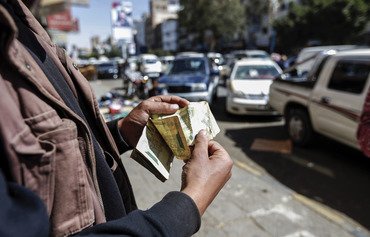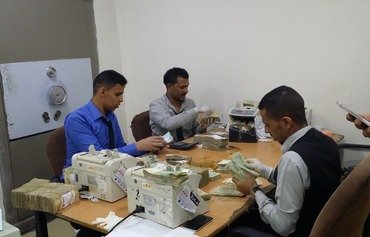Aden banks and money exchange firms resumed work on Tuesday (July 18th) after a two-day strike to demand for increased security of financial institutions in the province.
On Thursday, armed gunmen wearing military uniform attacked the National Bank branch in al-Mansoura district and killed and wounded several of the bank's employees, including branch manager Abdullah Salem al-Naqib.
The banks' decision to resume business came after the attackers were arrested and an agreement was reached with Interior Ministry officials to provide security protection to banks and exchange companies.
The agreement also included forming a committee to assess the security conditions at Aden's financial institutions and implement new security measures in co-operation with the police and other relevant agencies.
"We have agreed on a strategy which includes responsibilities and tasks that need to be undertaken by the interior ministry and security agencies, and other responsibilities on the part of banks," National Bank chairman Mohammed Hassan Halbub said.
Implementing this strategy will ensure major improvement of security measures at banks, he told Al-Mashareq.
"Several bank employees were killed and wounded in the terrorist operation that targeted the bank," he said, including branch manager Abdullah Salem al-Naqib who refused to give the attackers the keys to the safe so they shot him in the head.
Al-Naqib died of his wounds on Monday evening.
"The arrest of the criminals was instrumental in the banks' decision to put an end to the strike," he said.
Extended strike would have 'paralysed economy'
"The strike was a message of protest to the security situation and it has succeeded," Halbub said. "Now, we are going to work very hard to preserve the financial and economic stability."
The success of security agencies in arresting the attackers of the National Bank in Aden reflects the seriousness with which they have handled the case, Economic Media Centre head Mustafa Nasr told Al-Mashareq.
"The interior ministry pledged to provide the necessary protection to banks and money exchange firms, which has been the main demand for banks to resume work after this serious incident," he said.
An extended strike "could have paralysed the economy", Nasr said.

![Yemenis wait in line to withdraw money from an ATM machine. Banks and exchange companies have resumed work on Tuesday (July 18th) after a strike to protest an armed robbery on a bank in Aden province. [Faisal Darem/Al-Mashareq]](/cnmi_am/images/2017/07/18/8826-yemen-bank-aden-600_384.jpg)






